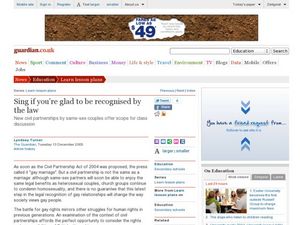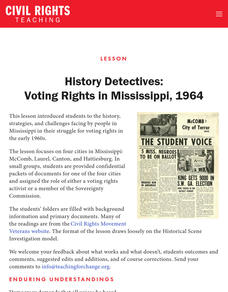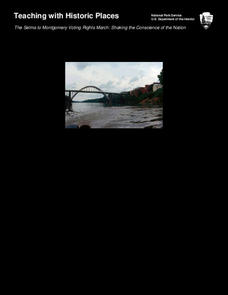Curated OER
Sing if you're glad to be recognised by the law
Equal rights, state law, and Civil Partnerships is the topic of this class discussion. Upper graders hone their research skills to engage in an intelligent and well-supported discussion on the Civil Partnership Act of 2004. Provided are...
K20 LEARN
Deconstructing Reconstruction: The Reconstruction Era
High schoolers examine the Reconstruction programs instituted following the American Civil War, the potential for change these efforts offered, and the realities that occurred. Guided by a PowerPoint presentation, class members read a...
Teaching for Change
History Detectives: Voting Rights in Mississippi, 1964
Promises made and promise broken. Spies and activists. Voting rights in Mississippi are the focus of a lesson that has class members research the history of the struggle in Mississippi. Learners take on the role of voting rights...
National Park Service
The Selma to Montgomery Voting Rights March: Shaking the Conscience of the Nation
Travel back in time to examine how tragic events can spur positive change. Scholars explore the impact of the Selma Voting Rights March, including the tragic loss of life and the later signing of the Voting Rights Act of 1965. Academics...
Teaching Tolerance
Jim Crow as a Form of Racialized Social Control
Just because slavery was illegal doesn't mean it went away ... Jim Crow Laws took its place. An eye-opening lesson focuses on how Jim Crow Laws were used as a form of racial social control against African Americans in the United States....
Intersectional Black Panther Party History Project, IPHP
Teaching the History of the Black Panther Party: 5 Essential FAQ’s
What are the facts about the Black Panther Party? Was it, as J. Edgar Hoover contended, a terrorist organization and a threat to national security? Or a group of indviduals bound together by a desire to protect and nurture their...
K20 LEARN
Plessy v. Ferguson: An Individual's Response to Oppression
After generating research questions rated to segregation, groups are given a primary source document (Jim Crow Laws, Black Codes, Plessy v. Ferguson, etc.) and craft a presentation that details the key elements of their assigned...
Teaching Tolerance
Racial Disparity in the Criminal Justice System
Explore the impact of the war on drugs in a thought-provoking lesson plan for high school academics. Young historians delve into the world of the criminal justice system and the racial disparity that occurs in the US. The resource...
Teaching Tolerance
Dismantling Racial Caste
It's time to end racism. The final installment of the series encourages scholars to consider what is needed to ended the racial caste system in the U.S. Young historians complete group discussion, written prompt, and a hands-on-activity...
Albert Shanker Institute
Dream Under Development
As part of their study of the 1963 March on Washington, class members do a side-by-side comparison of the original text of Martin Luther King's "I Have a Dream Speech" with a transcript of the speech he delivered. The take away from the...
National Park Service
Teaching with Historic Places: Discover the Jackie Robinson Ballpark
Can sports and popular culture change public opinion? That's the essential question asked by a lesson plan that looks at the role Jackie Robinson's appearance at City Island Ballpark in Daytona Beach, Florida played in the desegregation...
Facing History and Ourselves
The Legacies of Reconstruction
The final instructional activity in the seven-resource Reconstruction Era collection examines the legacies of Reconstruction. Class members investigate why the period has been called an "unfinished revolution," "a splendid failure," and...
Facing History and Ourselves
After Charlottesville: Contested History and the Fight against Bigotry
History doesn't always reflect all sides. Academics discover how the remembered history of the Civil War differs for White and African Americans. The instructional activity explores how Civil War monuments and celebrations have racist...
National Woman's History Museum
The Power of Words and Activism: Susan B. Anthony
Where have all the activists gone? Class members compare 21st-century activism with the suffrage movement and the work of Susan B. Anthony. They begin by examining Anthony's biography and speeches to find evidence that her words and...
US House of Representatives
Keeping the Faith: African Americans Return to Congress, 1929–1970
The third lesson in a unit that traces the history of African Americans serving in the US Congress examines the period from 1929 through 1970. After reading a contextual essay that details the few African Americans elected to Congress...
Curated OER
The Language of Human Rights
Did you know that there are 15.2 million refugees in the world? High schoolers will read "The Universal Declaration of Human Rights" and learn how they can get involved to lower this surprising number. To really encourage involvement,...
Maryland Department of Education
Our Children Can Soar
Amazing efforts of African American leaders are celebrated in a lesson plan on civil participation. The engaging resource focuses on primary and secondary sources to analyze the impact of African American leaders such as Ella Fitzgerald....
Teaching Tolerance
The War on Drugs—Mechanisms and Effects
The war on drugs doesn't have definite results. An interesting lesson plan examines the social, political, and economic effect of the war on drugs. Academics learn how the war on drugs has led to mass incarcerations and negatively...
Teaching Tolerance
Mass Incarceration as a Form of Racialized Social Control
Mass incarceration: A result of a tough stance on crime or racial discrimination, you decide. Academics explore the history and reasons behind mass incarcerations in the United States and its impact on ethnic communities. The...
National Woman's History Museum
Gloria Steinem, Feminism and “Living the Revolution"
Excerpts from Feminine Mystique by Betty Friedan and from Gloria Steinem's "Living the Revolution" provide high schoolers an opportunity to study the feminism of the 1950s and 1960s, sometimes called the "Second Wave of Feminism."
Curated OER
The Reformers: Martin Luther and César Chávez
Kids consider the characteristics needed to be reformers like Martin Luther King and Cesar Chavez. They read a series of quotes focused on both animal and human rights to answer eight critical thinking questions.
Teaching Tolerance
Understanding the Prison Label
Break the chain. An engaging lesson examines why it is so hard to break free of the prison system in the US. Academics participate in a reader's theater, read primary sources, and discuss their thoughts. The lesson explains the hardships...
K20 LEARN
LBJ and Voting Rights
Challenges to voting rights is not a new thing. Using President Lyndon B. Johnson's 1965 "The American Promise" speech on voting rights as a starting point, young historians research current voting rights laws and challenges.
Scholastic
Connecting with Ruby Bridges
When Ruby Bridges entered an all-white school in New Orleans in 1960, she also entered history. Scholars consider what the experience must have been like for the young girl using two books that document her experience as well as a double...
Other popular searches
- Civil Rights Movement
- Civil Rights Act
- Civil Rights Harriet Tubman
- Civil Rights Music
- Civil Rights Movement Music
- Civil Rights Act 1964
- Civil Rights Era
- Civil Rights Act of 1964
- Civil Rights Legislation
- Children's Civil Rights
- U.s. Civil Rights
- American Civil Rights Movement

























